#1984 adaptation
Explore tagged Tumblr posts
Text

kill me now
#I am not looking forward to doing the gray tubes#the gray tubes are such a pain in the ass#ugh#voxel art#1984 adaptation#set design#taking a break and then gonna add the cameras to the tops of each one#This set is so overstimulating to look at good god#It’s horrible#I love how my director friend’s posts about his work are all “So excited to be on set with everyone! Dig these pictures:”#and all my posts about my work are just “I hate animating I hate myself I hate everything#and immediately upon finishing this piece of shit I will channel my inner Gunne Sax and hang myself in the closet”#And the hilarious thing is that I somehow have the healthiest work ethic between the two of us#The difference between live action and animated production lmfao#Sitting in front of a screen overstimulating yourself agonizing over a character’s right foot for years will do that to you
1 note
·
View note
Text

MDZS x Brazil (1985)
(Yes. Real movie dialogue)
#poorly drawn mdzs#mdzs#MDZS AU#lan wangji#wei wuxian#Backstory to this is 'we recently watched Brazil (1985) and this scene make us lose our minds.'#Brazil (1985) is best described as 'The Monty Python Crew does an adaptation of George Orwell's 1984 (1949).' Because it is.#And let me just say. I think it is the perfect adaptation. Somehow this film manages to be one of the best dystopia satires out there#While also being a genuine critique of capitalism and burocracy.#Plus the practical effects and set design were outstanding.#The 'romance' in this movie was definitely also a satire.#It is unbelievably wacky. I'm dead serious when I say this comic is beat for beat something that happens in the film#Guy who told this women *nothing* about the peril she's in form the government tells her he (legally) killed her.#She responds by saying “Care for a little necrophilia?” with NO ROMANTIC LEAD UP.#THE MUSIC SWELLS. HE TEARS OFF HIS JACKET AND DIVES INTO THE BED. SCENE END.#Jill Leyton has incredible range as a hot butch and hot femme. Was the line bizarre? Yes. She can pull it off though.#We paused and watched it back a few times. I wasn't intending to make a crossover this obscure but honestly...#It's...it's too good of a fit to pass up. Wei Wuxian *would* say that...
1K notes
·
View notes
Text


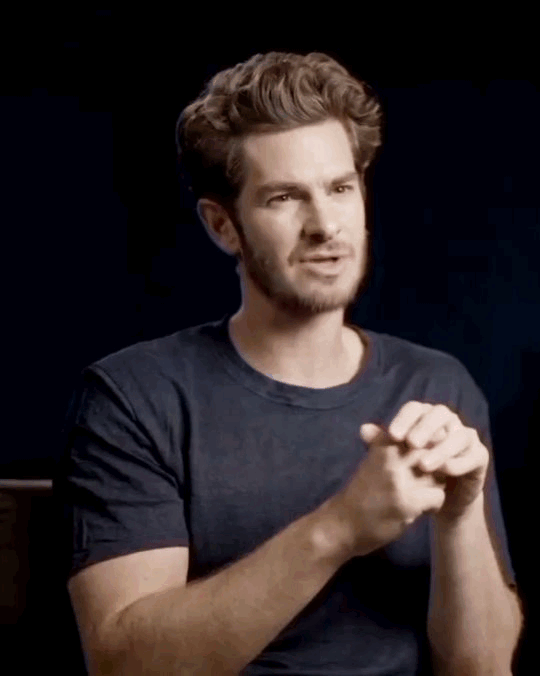
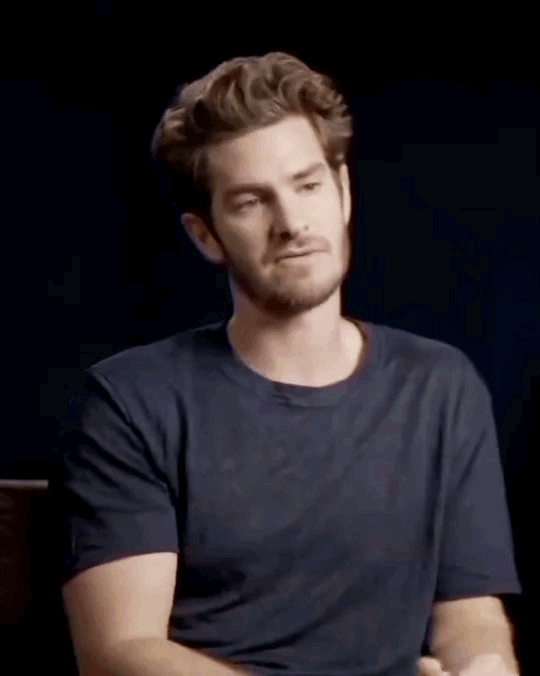
ANDREW GARFIELD talking about playing Winston Smith in Audible Adaptation of George Orwell's '1984'.
#george orwell 1984#audible.com#andrew garfield#interview#my beloved#he's so expressive#we need andrew garfield to do more voice acting#voice artist#voice acting#audio adaptation#audio drama#george orwell#my gifs#gif set#gif#sincericida
157 notes
·
View notes
Text
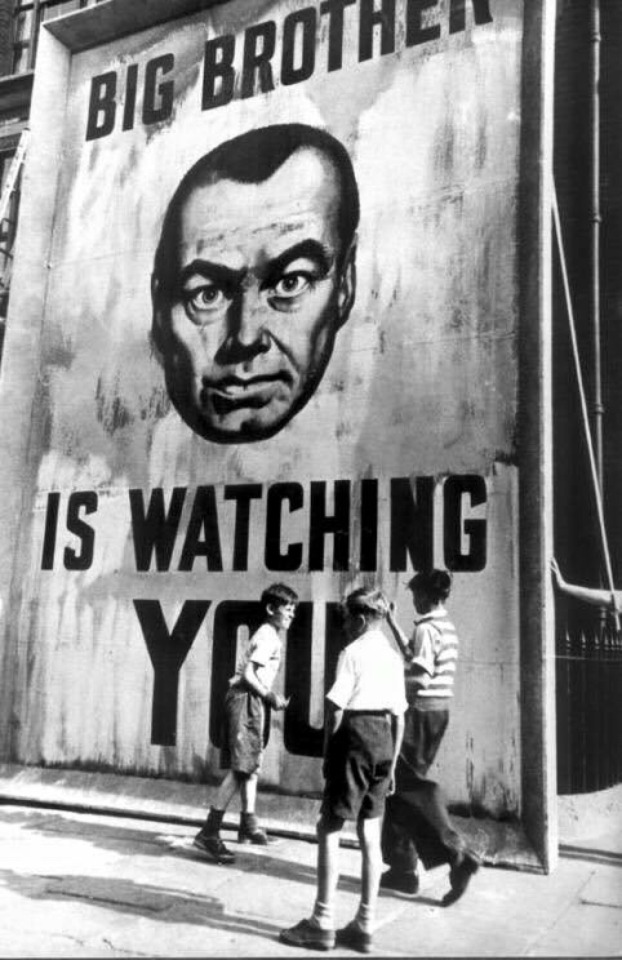
#1984#george orwell#big brother#richard burton#dystopia#our future#authoritarianism#movie adaptation#endless war#thought police#war is peace#cult of personality#ministry of truth#propaganda#winston smith#animal farm#doublethink#thought crime#brave new world#fuck maga#maga morons#MAGA#totalitarianism#ingsoc#ministry of love#big brother is watching you#donald trump
60 notes
·
View notes
Text
my favorite holmes and Watson adaptations are always like-
the best and most accurate versions of themselves to the book renditions and frequently regarded as the best Sherlock Holmes adaptations ever
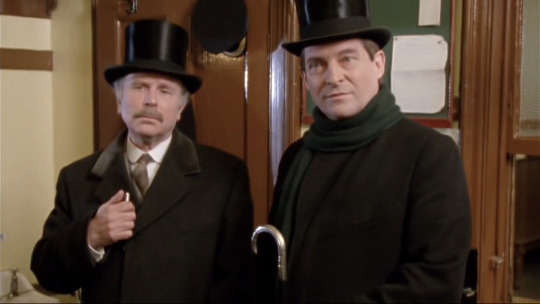
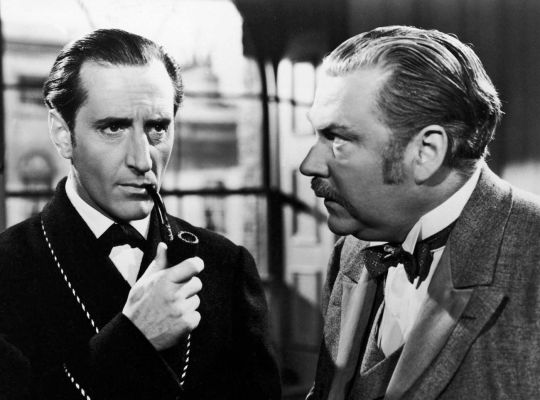
and
these two fucks I found off the street. they are like street rats to me. endearing street rats.
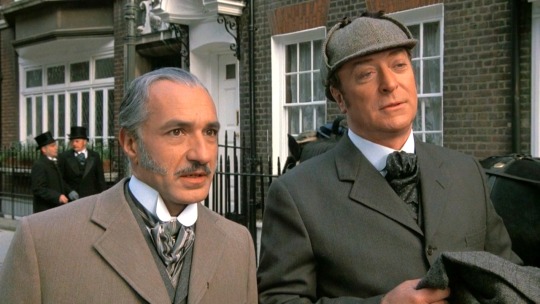
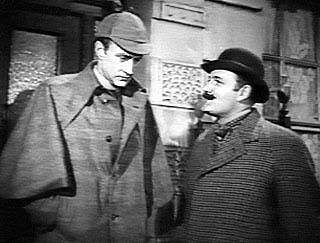
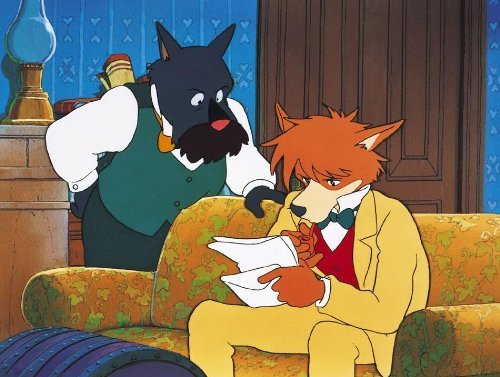
#acd canon#sherlock holmes#acd holmes#sherlock holmes adaptations#sherlock holmes 1984#granada holmes#basil rathbone#sherlock holmes 1954#howard holmes#sherlock hound#idk how to tag the Without A Clue boys? do they have a tag on tumblr??#without a clue#I looked it up#they do#its just a very tiny community. I REQUIRE MORE OF THEM NOW
208 notes
·
View notes
Text
Which version of this do you prefer?










#there are truly. SO many versions of A Christmas Carol#I will add this to the “maybe getting a part 2” list#less definitive about it than things like robin hood or les mis which will definitely have a second part at some point#but there might be enough prominent versions to justify another poll for this#also theres SO many theater adaptations that I didnt really end up including them just because it was a bit hard to distinguish#which were and werent notable#polls#tumblr polls#adaptation polls#a christmas carol#charles dickens#scrooge#ebenezer scrooge#a christmas carol 1938#a christmas carol 1951#mr magoo's christmas carol#scrooge 1970#scrooge 1951#a christmas carol 1984#scrooged#scrooged 1988#the muppet christmas carol#a christmas carol 1997#a christmas carol 2009#books#films#tv specials#tv movies#animation#animated films
33 notes
·
View notes
Text

A Soldier's Story (1984). An African-American officer investigates a murder in a racially charged situation in World War II.
While it'll never quite stack up when it comes to the In the Heat of the Night comparisons (the two films share a director and thematic throughline after all), this is still an excellent, intelligent thriller grounded in great performances and a sharp script. Denzel Washington's the clear standout (I can't believe this is only his second feature!), but he's bolstered by a great cast all around. Just a really great watch. 8/10.
#a soldier's story#1984#Oscars 57#Nom: Best Picture#Nom: Supporting Actor#Nom: Adapted Screenplay#Norman Jewison#charles fuller#howard e rollins jr#adolph caesar#denzel washington#art evans#David Alan Grier#1940s#america#american#race#crime#8/10
81 notes
·
View notes
Text

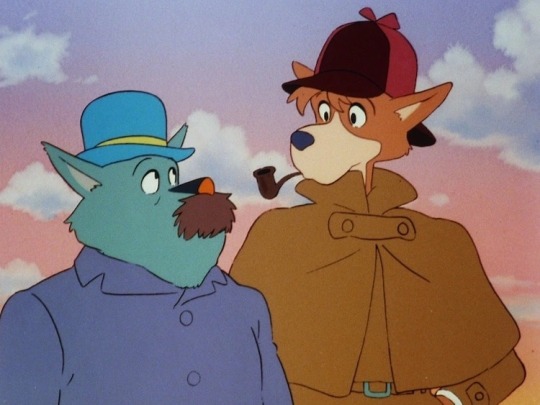


Sherlock Hound from Sherlock Hound (1984)
7 notes
·
View notes
Text
I think watching various Dune adaptations and seeing how much they fundamentally understood of the actual substance or how much they decided to Just Go Off on the Aesthetics(TM) or play this drama absolutely straight is my favorite indulgence.
Like, say what you will, they are all in wildly different places on this scale, but that's half the fun (especially given the source material)!
#dune#frank herbert's dune#dune (1984)#scifi channel dune#dune (2021)#dune (part 2)#the dune movie that didn't get made but is legendary nonetheless#it's about embracing the idea of letting your costumers and set designers just eat :)#listen they are all wonderful and shit at the same time#i love it#the sliding scale of good with adaptation#is it faithful to the letter of the book or the spirit?#or did they just go feral (valid)
13 notes
·
View notes
Text
#poll#polls#pop culture polls#tumblr polls#pop culture#character poll#actor poll#adaptation poll#scifi poll#Paul Atreides#Dune#Kyle MacLachlan#dune 1984#Alec Newman#dune 2000#dune 2021#Frank Herbert#movie polls#Timothée Chalamet
8 notes
·
View notes
Text
Yall I'm so sorry I do not like Peacemaker
#that show annoys me down#my hatred for it is not as bad as the cw verse#but the writing in that show legit pisses me off#and i hate the directon the dcu film verse whatever is going#like theres one gross ass line about a certain flop actor that you wont get without context#that whole style of writing is bad and terrible and i hate how so many comic adaptations have that humor#ur not funny#Please do not bring up comic adaptations around me unless its the reeveverse#not even the new superman movie im interested in#its so funny that i disagree with the snyder fanbase on most things EXCEPT that the new superman movie looks bad but ik its gonna get praise#and clog my tl for like weeks afterwards#this is the part where i would like be sorry about the rent but i love bitching and moanjing about how much i hate comic adaptations like#i hate them sooooo much#doom patrol was a breath of fresh air since it actually LIKED the material and engaged in it in a edgy yet sincere way that so many comics#but ALSO it was actuallly good and played wth the medium in a really cool way and was well written and fun and actual good gay rep#Is the batman the best most well written thing ever? NOPE! but it does adapt the comkc in a way i find interesting#titans was shit from a butt and i only watched it because the actors were so well casted. like even krypto was perfect#I never watchrd harley quinn and dont plan too but i feel like i might like that#you couldnt pay me to watch that kite man shit#snyderverse was trashhhh except the snyder cut#for some reason i just never watched wonder woman 1 but i watched 1984 and i wanted to kms#nobody is doing it worse than marvel. even the bad movies get praised by critics#pure formulaic bs#idk i am obviously the target audiences for that shit but i have zero desire to see superman or the upcoming comic books movies from dc or#marvel
6 notes
·
View notes
Text
youtube
Sherlock Holmes: Study in Red
#sherlock holmes study in red#sherlock holmes#study in red#bbc sherlock#sherlock fandom#sherlock & co#sherlock fanart#sherlock holmes 2009#sherlock holmes 1984#sherlock holmes 1979#sherlock holmes 3#sherlock holmes rp#sherlock holmes roleplay#sherlock holmes the awakened#sherlock holmes in the 22nd century#sherlock holmes adaptations#sherlock holmes a game of shadows#sherlock holmes acd#sherlock holmes art#sherlock holmes fanart#sherlock holmes fanfiction#sherlock holmes books#sherlock holmes bbc#sherlock holmes x john watson#john watson#doctor watson#cbs elementary#victorian#dark academia#dark acadamia aesthetic
9 notes
·
View notes
Text
"A Christmas Carol" Adaptations: Top 5 Saddest Versions of Tiny Tim's Death (long)
@ariel-seagull-wings, @cliozaur, @warrioreowynofrohan
Since the Christmas season is almost officially over, and my annual hyperfixation on A Christmas Carol will need to be paused for another year, I decided to make this post while I still can.
These are my votes for the five saddest, most poignant filmed versions of the vision in Christmas Yet to Come of the Cratchits mourning Tiny Tim's death. A scene which fortunately never takes place in the real world thanks to Scrooge's redemption, but which is still heartbreaking as the Ghost shows Scrooge what might happen.
Honorable mentions include the silent graveside scene in Mickey's Christmas Carol (Mickey Mouse crying – enough said), the similar brief yet touching graveside scenes in Scrooge (1970), A Christmas Carol: The Musical (2004), and Scrooge: A Christmas Carol (2022), and the scenes in the 1938 MGM film (mainly for the quiet yet deep grief Gene Lockhart's Bob conveys under the brave face he wears) and the 1999 TV film (mainly for showing Tim's body as Bob sits by his bedside, the first version since 1935 to do so).
Scrooge (1935) (Donald Calthrop as Bob Cratchit, Barbara Everest as Mrs. Cratchit, Sir Seymour Hicks as Scrooge)

This is the most complete rendition of the scene from the book, and it's well done. From the opening as Mrs. Cratchit leaves Tim's bedroom in tears, through the subsequent slow pan through the house's main room, showing the gloomy children and Tim's empty stool and crutch amid gentle music, the poignant tone is established, and it increases after Bob comes home. This Bob avoids breaking down in front of his family, but as he slowly walks up the stairs toward the bedroom, alone, he's suddenly overwhelmed and sobs into his hands. Then he slowly enters the candlelit room, where – in a rare touch that no adaptation would repeat until 1999 – we see Tim's body laid out on the bed in full view. Ever slowly, Bob approaches, sits down, and murmurs "My little child," then kisses Tim's forehead. The whole sequence, underscored by soft choral music, has an air of delicate grief and reverence, similar to the famous scene of Disney's seven dwarfs mourning for Snow White that would premiere two years later. It might seem almost mawkish by modern filmmaking standards, but in an unabashedly old-fashioned and stagy 1930s film, it works. Meanwhile, the unseen Scrooge utters the narrator's words from the book: "Tiny Tim, thy childish essence was from God!" The scene ends with consolation, though, as Bob goes back downstairs and tells his family about Fred's sympathy, then gives his speech about how none of the family will forget Tiny Tim (holding Tim's crutch as he speaks it), and they all gather warmly around him. Dickens would have approved of a scene so faithful to his writing.
A Christmas Carol (2009) (Gary Oldman as Bob Cratchit, Lesley Manville as Mrs. Cratchit, Jim Carrey as Scrooge)
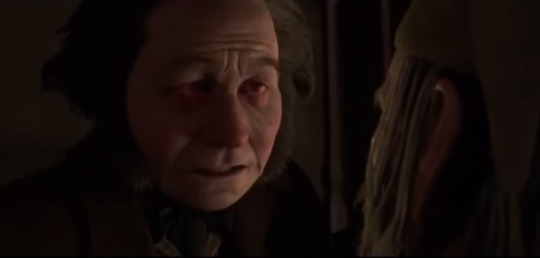
This CGI motion-capture film gives Tiny Tim the short shrift as a character, but it makes this scene effective through its portrayal of the family's raw grief and of Scrooge's horror at what his selfishness has caused. Whether to keep the scene fresh or due to changing social mores about grief, there's much less emphasis than usual on the family trying to be cheerful and hide their pain for each other's sake, and more open emotion. Most of the scene shows the Cratchits at a distance, without close-ups, but the pain can be heard in their voices: Mrs. Cratchit is crying, the daughters are crying, and even teenage son Peter is just barely restraining his tears. Then when Bob arrives, he makes only a brief, feeble attempt at cheerfulness before breaking down sobbing "My little child!" in anguish. Then comes the unforgettable moment, which takes full, rare advantage of the fact that the Cratchits can't see or hear Scrooge: Bob wanders to the stairs, where Scrooge is sitting, and unknowingly on Bob's part, the two men come face to face. Scrooge is horrified by the sight of Bob's exhausted, red-eyed, utterly broken face staring into his own. He longs to comfort him and apologize for failing to save Tim, and chokes out "Bob!" in an anguish-soaked voice – that single syllable may be Jim Carrey's best acting in the film. Yet Bob walks straight through him to go up to the bedroom, where we see just the shadow of Tim's body cast on the wall by the candlelight as Bob sits down and sobs at his bedside. Without losing Dickens' gentle touch, this is probably the most raw rendition of the scene.
A Christmas Carol (1984) (David Warner as Bob Cratchit, Susannah York as Mrs. Cratchit, George C. Scott as Scrooge)
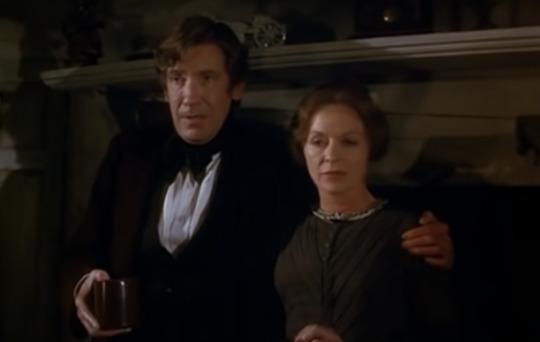
This rendition of the scene is slightly more subdued than the above two, but its "tenderness and depth of feeling" (in the words of this version of Scrooge) stand out all the same, chiefly thanks to the acting of David Warner and Susannah York. As portrayed by York, Mrs. Cratchit is clearly the family's pillar of strength in this version, more so than in others; through her face is weary with grief, she restrains her tears – albeit not without a quiet struggle – and provides support and stability to her family. Meanwhile, Warner's Bob is warm and tender as always, and he tries to be cheerful, but his pain is closer to the surface than his wife's. As he speaks of visiting Tim's grave, he finally breaks down and weeps quietly into his youngest daughter's hair; then he tries to pull himself together and assures his family of how grateful he is to still have all of them, only to break down again while telling them about Fred's sympathy. But Mrs. Cratchit takes gentle command of the moment and encourages her husband: "Tim is part of all of us. For his sake, we must go on living. So long as we love one another, he will always be alive." Bob takes her words to heart, but he adds that surely none of the family will ever forget Tiny Tim, which the children all assure their parents that they never will. "I am a truly happy man" Bob concludes; despite the scene's sadness, we feel that he means it, with such a wonderful, tender family to support him through the loss and to always treasure Tim's memory. This scene stands out for the Cratchits' sheer warmth, tenderness, and quiet strength as they support each other.
Scrooge (1951) (Mervyn Johns as Bob Cratchit, Hermione Baddeley as Mrs. Cratchit, Alastair Sim as Scrooge)

This film is widely considered the greatest cinematic Christmas Carol, so naturally its version of this scene is especially poignant. It opens with a pan through the melancholy room as Peter reads a long passage from the Bible: not the Mark verse quoted in the book, but Psalm 91, which describes God providing strength and refuge. This change enhances young Peter's characterization, I think, showing his effort to support his mother and sisters through the tragedy. But he can only do so much, as we see Mrs Cratchit gaze mournfully at Tim's empty stool and crutch, and as their subsequent dialogue places Peter in closeup and makes his own grief for his little brother evident. When Bob arrives, the script departs from Dickens' dialogue as he tenderly describes his visit to the spot where Tim will be buried. He reveals that as he stood there, he seemed to feel Tim's hand slip into his own, and he felt comforted; he believes Tim's spirit was there, telling him that he's happy now and that the family must stop grieving and try to be happy too. But Mrs. Cratchit can only look at him with her eyes full of tears, and at the sight of her grief, Bob finally gives into his own. "Oh Tim! My Tiny Tim!" he sobs, burying his face in his hands. His wife kneels down and clasps him in her arms, and the scene ends as they hold each other in anguish. The musical score, with a gentle rendition of "Silent Night" underscoring Peter's Bible verse, and a slow version of Tiny Tim's theme – an innocent, music box-like tune – underscoring Bob's speech, adds greatly to the scene's moving effect.
And the #1 rendition of the scene:
The Muppet Christmas Carol (1992) (Kermit the Frog/Steve Whitmire as Bob Cratchit, Miss Piggy/Frank Oz as Mrs. Cratchit, Michael Caine as Scrooge)

Maybe it's sacrilegious to give my preference to a version of this scene where the Cratchits are frogs and pigs. But somehow, the Muppets and Michael Caine give it a poignancy like no other. The Cratchits go through the same motions they did in Christmas Present – Mrs. Cratchit and the children busy preparing dinner in the kitchen, the children all hugging Bob when he arrives, etc. But instead of happily bustling around, Mrs. Cratchit is crying; instead of comically tackle-hugging Bob, the children hug him tenderly and sadly; and rather than from church, Bob has come from the churchyard. He reveals that he chose a gravesite for Tim "where he can see..." but then stops, and explains that it has a view of the ducks on the river, which Tim loved to watch. Kermit's Bob has no "My little child!" breakdown – true to Kermit's character as a leader, he stays strong for his family – but his grief is still very clear. Each time he says "Tiny... Tim," he struggles as if he can hardly bear to say his son's name. Meanwhile, Scrooge is distraught. "Oh Spirit," he pleads, "must there be a Christmas that brings this awful scene? How can we endure it?" Finally, Bob consoles his children, saying "Life is made up of meetings and partings, that is the way of it," and that surely they'll never forget Tiny Tim. The tone of delicate yet deep sadness is only enhanced by the score, which gently reprises Tim's song "Bless Us All" throughout the scene. At the end, the camera slowly zeroes in on Tim's empty chair and crutch by the fireplace, as a horn plays the melody of "And in our prayers and dreams, we ask you bless us all." Making this scene even sadder is its subtext for the Muppets: the recent deaths of Jim Henson and puppeteer Richard Hunt. Kermit/Bob's "meetings and partings" speech is easily just as much about Henson and Hunt as about Tiny Tim. For that reason and others, this has my vote as the most poignant filmed version of Dickens' sad scene.
#a christmas carol#adaptations#comparison#tiny tim#bob cratchit#scrooge 1935#a christmas carol 2009#a christmas carol 1984#scrooge 1951#the muppet christmas carol#tw: death#tw: child death
11 notes
·
View notes
Text

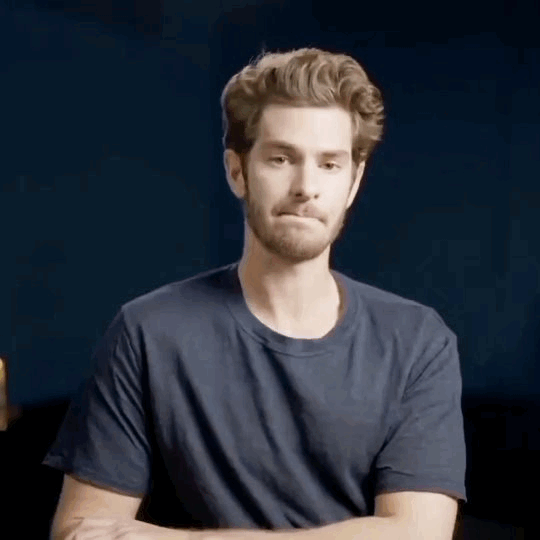


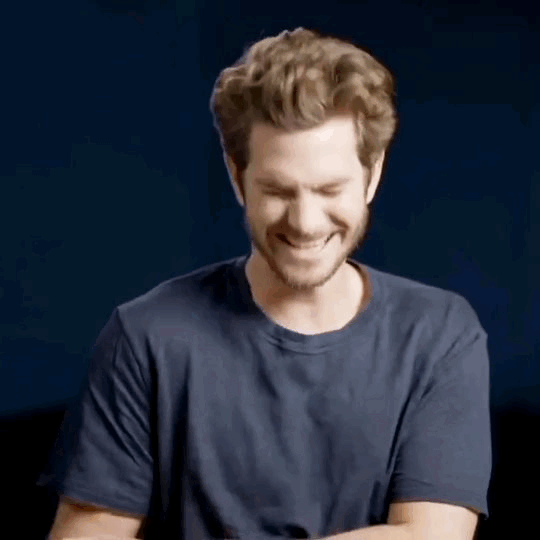



ANDREW GARFIELD talking about playing Winston Smith in Audible Adaptation of George Orwell's '1984'.
So many expressions
(video)
#andrew garfield#his expressions#the nose scrunch#i just 🥺🥺🥺🥺#he's so silly#he's so babygirl#he's so adorable#his laugh#i love him#my beloved#thinking things#interview#george orwell 1984#audible.com#voice acting#voice artist#we need andrew garfield to do more voice acting#audio adaptation#audio drama#george orwell#gif set#my gifs#gif#sincericida
71 notes
·
View notes
Text

When I tell you my jaw dropped--
#tmnt#tmnt mirage#tmnt 1984#huh i wonder why this plotline hasnt been adapted#(unless it was in the 1987 show or 90s movies i wouldnt know)#baxter stockman
11 notes
·
View notes
Text
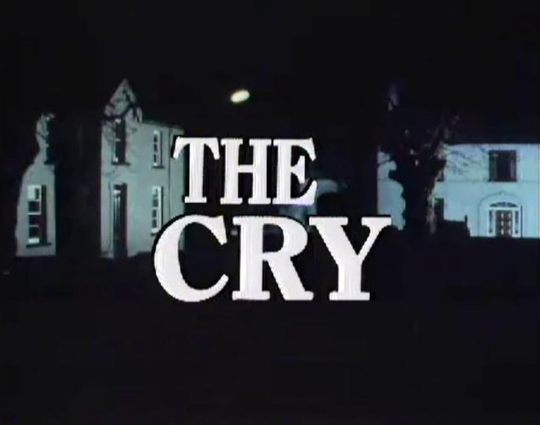
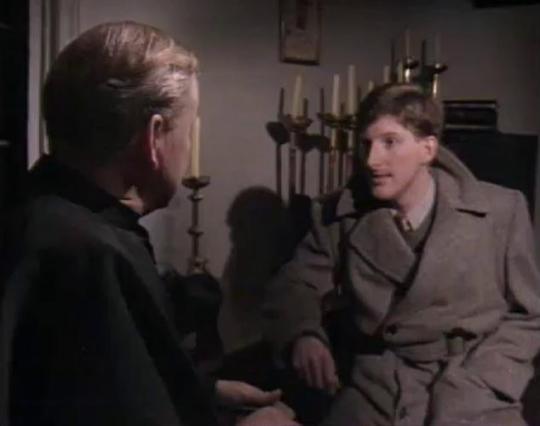
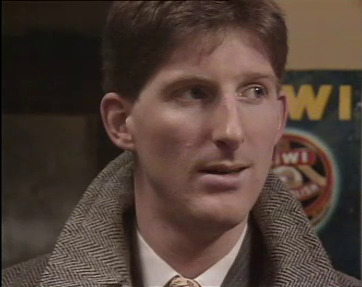


Play for Today: The Cry (BBC, 1984)
"It's best forgotten about."
"You're not gonna be making a complaint?"
"Complaints? We're not making any complaints! We don't want to know about any complaints."
"Complaints against who?"
"Well, the police."
"Who should I complain to about the police?"
"Well, the police, I suppose."
"What good would that do me?"
#play for today#the cry#1984#christopher menaul#derek mahon#adrian dunbar#michael duffy#doreen keogh#breffni mckenna#carol moore#rio fanning#john keegan#michael gormley#peter quigley#oliver maguire#derek lord#birdy sweeney#stella mccusker#denys hawthorne#one of the very final Plays for Today before the series was formally shelved in mid 1984; adapted from a short story by celebrated Irish#writer John Montague‚ this is a short‚ tightly wound entry among those final plays. it concerns a Northern Irish journalist returning home#and witnessing first hand the casual brutality of the Ulster Special Constabulary (commonly called the B Specials) in the late 1950s#the focus however is not on the act of violence which opens the play‚ but on the reactions of the local populace: Dunbar's journo decides#to write about the event (pushed by his father‚ a revolutionary who'd rather his son used a gun than a typewriter; the scenes of them#debating political activism could very easily have been laid on too thick but actually they're pitched just right). he's met with fearful#silence at every turn‚ with nobody willing to speak up and face inevitable reprisals. it's a horribly tense piece; through modern eyes i#kept waiting for some terrible fate to befall Dunbar (ie. his being killed) but actually‚ as the play makes clear‚ his terrible fate is the#disillusionment he suffers: in the people he once respected who he now views as cowards‚ in the system he once felt neutral about but now#detests‚ and in his own ideals about using a free press to bring about substantial social change peacefully‚ which now appears impossible#Menaul ends the play with news coverage of the violent suppression of protestors a decade later; it's a powerful end to a powerful piece
5 notes
·
View notes